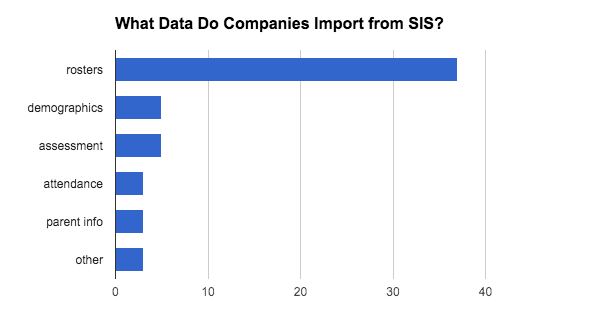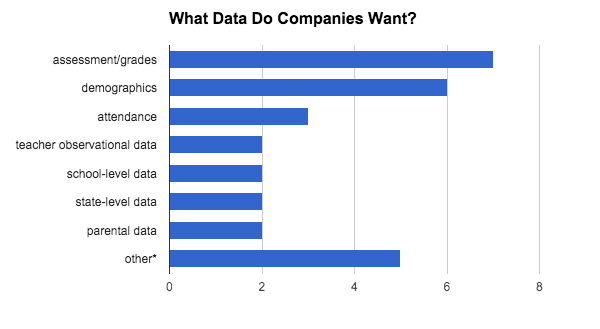From the public downfall of inBloom in May to the rise of data integration startups such as Clever, Learnsprout, and others, the K-12 data integration space has been among the most dynamic segments of the broader education technology market in the past six months. In order to better understand best practices and pain points in this fast-moving space, I decided to conduct phone interviews with executives at 46 different edtech companies, specifically investigating adoption of Student Information System (SIS) integration and Single Sign On (SSO) tools. Below are my findings and recommendations for edtech companies.
Findings
First and foremost, almost all of the edtech companies I interviewed (n = 40) integrate with Student Information Systems (SIS). Of these, companies most commonly pull class roster data from SISes. In the data import process from SISes to edtech applications, the most popular method for pulling data is manual CSV import, followed by Clever’s automated API. In the data export process from edtech applications back to SISes, there are no automated APIs--instead, some companies manually export data in CSV format back to SIS and LMS gradebook systems.


Regionalism plays an important role in SIS integration methods. For smaller edtech companies that cover specific regions, they are more likely to use either manual techniques such as CSV export or SFTP database hook-up, or, if they use automated API solutions, partner solely with the SIS provider in their region, such as PowerSchool in the Chicago area. For larger, national edtech companies, they either have custom automated API systems that they built in-house, or partner with a provider such as Clever.
Fewer companies use Single Sign On (SSO) (n = 24) than SIS (n = 40), but there is growing interest. The SSO tool market is crowded. Unlike SIS, small and large edtech companies have different attitudes about the utility of SSO. Small companies are hesitant about implementing any SSO solutions due to lack of demand from their schools. Large companies see SSO as a competitive differentiator and are actively seeking multiple SSO integrations. The most popular SSO tools are Google Apps for Education, Active Directory, Edmodo, and LDAP.

In addition to what tools are currently being used, I found three unsolved pain points in this still nascent market.First, the data that is imported through automated SIS integration tools (class roster data) is one narrow slice of the total data stored in the SIS. One major reason for this is the shadow of inBloom’s downfall--while companies listed demographic data as nice to have, they were also cautious about acquiring it.

Second, while there are now automated data solutions in SIS integration, these integrations are one way - pulling (importing) data from the SIS into a tool rather than pushing (exporting) new data from the tool back into the SIS or other systems. On the export side, there is demand for edtech entrepreneurs to fulfill this need--companies demand tools to export data back to SIS tools, LMS gradebooks, and other data dashboards.
Finally, with tens of thousands of different assessments around the country, assessment data normalization, or naming conventions, across different types of assessments is an issue.
Recommendations
For edtech companies looking for an SIS tool, two important dimensions to think about are the size of your company and the frequency with which you need up-to-date SIS data, such as class roster data. If you are a small company with infrequent data needs (e.g. once a semester), one-off solutions such as CSV import and SFTP database hookup may be sufficient. For larger edtech companies, automated solutions like Clever may make sense.
For edtech companies looking for an SSO tool, size of company is again an important factor. Smaller companies may want to wait and see which SSO tools are better to implement as the market develops. For larger companies with more resources, SSO integration could be a competitive differentiator in selling to school districts, so multiple integrations may be worth exploring.
As a final note, it is important for all edtech companies to adhere to data standards such as LTI and SKORM. This is a collective action problem where most companies I interviewed expressed its importance, but very few companies find it beneficial for their individual decision-making. For companies with more influence, championing data standards alignment is an opportunity to build thought leadership, generate positive brand awareness, and improve the entire market.


